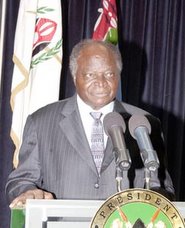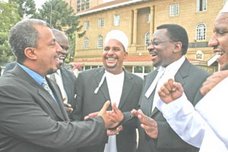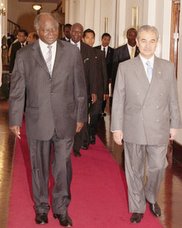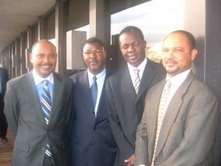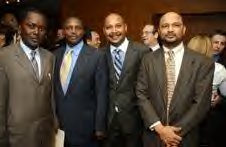_________
I abhor sycophancy in whatever form. It was reported that during a leaders’ meeting at Kyuso District Commissioner’s residence last week, in the presence of Prsident Mwai Kibaki, the acting District Commissioner David Jakaiti attempted to block Kalonzo Musyoka and his Mwingi South counterpart David Musila, from addressing the meeting.
One would infer that Jakaiti was trying to protect his battered bread in front of his overall boss and his immediate supervisor -John Michuki. But times have changed. What was Jakaiti thinking in blocking people’s elected representatives from addressing their own constituents?
Was he perhaps trying to ensure that his action would guarantee his job confirmation to a full DC from the acting capacity? For heavens sake, Musyoka and Musila were the host Members of Parliament. By denying local politicians a chance to address their constituents in front of the President was wrong.
We are in a democratic society and not a one party rule or in a totalitarian government. I am glad that President Kibaki, a true democrat and statesman to boot boldly came to the rescue of the situation, where he averted it by giving Musyoka a chance to speak.
The former Environment Minister was allowed to address the gathering and in turn invited Musila do the same. The acting DC's hostility to the local politicians will most likely undermine his effectiveness in the area, and perhaps, the best thing will be transfer him elsewhere . Unless of course Jakaiti’s immediate supervisor, Michuki, would love to have a hostile underlying in Musyoka backyard. Having castigated the over-zealous and equally over-obedient Jakaiti, I must say that it was inappropriate for the one time Foreign Affairs Minister to play politics at this the presidential event.
Kalonzo always likes to paint himself as an accomplished diplomat but playing cheap politics is not being diplomatic at all. The President was visiting Eastern province’s Ukambani sub-region and presiding over the commission several Government funded projects in the province.
These were events planed earlier and as such he was not trying to woo voters. For Kalonzo to raise political issues by telling Kibaki to his face that he should brace for a tough political battle in the forthcoming General Election was cheap and tactless politics.
It was the wrong time at a wrong place to play politics. President Kibaki has run three presidential campaigns, two unsuccessful and one successful, where he has was the candidate himself. It is without a doubt Kibaki is the most experienced and seasoned of all the presidential candidates in the country today.
He does not need to be informed that he will face an uphill battle come next Election. Furthermore, Kalonzo is not guaranteed to capture the ODM-K presidential nomination ticket, unless of course, he plans to be in the race no matter the out come.
Kalonzo might have impressed his loyal supporters and thinking he is being courageous, but there is nothing courageous in what he did but a lack of manners in disrespecting the President and the Presidency.
***
Halt move on new constituencies
I think the whole idea and attempt to create new constituencies and "special parliamentary seats"-for women, youth and the disabled- is the right one but the timing is inappropriate.
Timing is every thing and in this case timing is completely off the mark. Without a doubt many Kenyans are wondering why all of a sudden the Government of National Unity, or the GNU, thinks it is prudent to come up with a Bill to create new constituencies at a time when the country is already in election fever – we are less than six months from the ‘mother of all general elections’
If the Justice and Constitutional Affairs Minister Martha Karua and her group think it make good sense to create more constituencies and "the special parliamentary seats" why wasn’t it done last year, or two or even three years ago?
The country’s population explosion did not occur in the last six months or so. You can’t blame those who are against the move from reading into this as sinister motives in Madam Karua’s (and in extension the GNU) proposal.
Why such a rush? In this aspect it is not a question of siding with the Opposition or not, but I think it is fair to say that some GNU hawks are overstepping their bounds in their zealous endeavour to protect their butter soaked bread and to make sure they remain in power after the next General Election by hook or crook.
Sad to say but the fact remains that it is politicians and the president's handlers such as Martha
Karua and some of the other GNU hawks who by their actions indirectly spoil the good name of the government of President Mwai Kibaki.
This reminds me of the former US Defense Secretary Donald Rumfeld’s hard headed decisions that sink the Bush Administration in the Iraq quagmire.
It is for legal scholars and other constitution experts to determine the right way of approaching what seems to be too delicate a matter. They are two schools of thoughts as to how we should go about handling the matter — if it is through an Act of Parliament or through constitutional amendment.Personally I do not support the views of the ODM-K leadership that the Government intends to rig the Election in its favour or that the whole idea of creating new constituencies is to increase the Government numerical strength as most of them will be in the populous and government friendly regions.
Kibaki is going to win re-election, rigging or no rigging. In addition, the National Assembly will have a majority Kibaki friendly MPs, new constituencies or not.
I can boldly say that the bottom line should be that the proposed new constituencies and the "special seats" should be implemented in the 2012 Election and not this year.
***
How about trying to do it the American way?The two major political parties in the United States, the Republican Party and Democratic Party have more than fifteen presidential aspirants combined. Each of the candidates is trying to become the nominee of his or her respective party without doing any joint rallies or campaign appearances.
The only time they are seen together in one room is when there are appearing for their respective parties’ presidential debates. They don’t meet for breakfasts or to lunches strategize how to beat their opposing party’s opponent. In Kenya, we see ODM-K candidates conducting joint rallies, and meetings for breakfasts and lunches.
In addition, when ODM-K presidential aspirants launched their respective "visions" it was done in the presence of some of their perceived “rivals”. For instance, we witnessed Raila Odinga praising Musalia Mudavadi for his vision and Balala praising Odinga Raila for his, et al. In one of the joint rallies, we read reports that, one of the leading ODM-K candidates Kalonzo Musyoka was booed, interrupted and disrupted by the ODM-K crowed when he stood to address them.
The rally in Mombasa was their party’s political rally, why boo one of their own beats me. Was that the work of one of the Mwingi North legislator’s rivals within their own party? Your guess is as good as mine. In the US, it is a different ball game.
For instance, in the Democratic Party, the two leading candidates, Senators Barack Obama and Hilary Clinton are fighting it out until the bitter end. But whoever loses the nomination will automatically support and endorse the winner.
The same is the case in the Republican Party’s three leading candidates, former New York Mayor Rudy Giuliani, former Massachusetts governor Mitt Romney and Senator John McCain. Simply put, whoever wins the nomination of their respective political party will automatically count the support and endorsement of his or her former rivals for the coveted ticket, but until then they are not together and their friendships is shelved. They don’t dine and wine together as is the case with what is happening in Kenya.
It is not fair to expect the American democratic tradition to become part and parcel of our political way of life in only forty years since we attained our independence and even shorter period since we became a truly multi-party democratic country.
Americans have come along way as they recently celebrated 231 years of independence. But there is nothing wrong to copy and emulate the United States, as most of politicians are found to visit this great nation.
omarahamedali@gmail.comhttp://www.timesnews.co.ke/22jul07/edi








